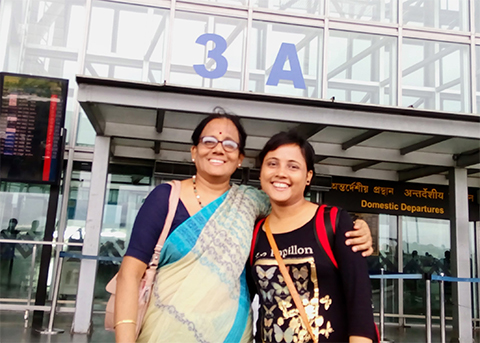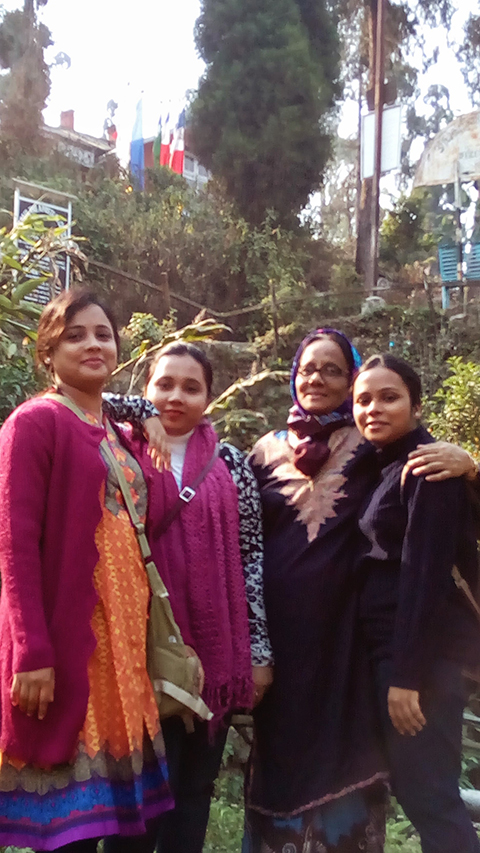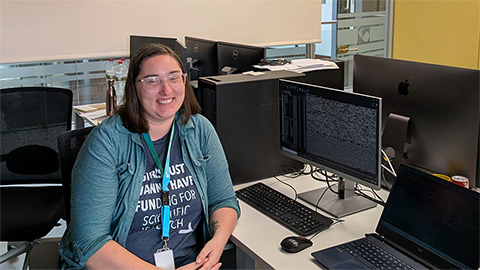
A scammer almost derailed my studies in America
I am a person of calm and decisive mind. I have never indulged in impulsive purchases or investments, rather I am cautious of every expenditure.
Leaving home for the first time in 2016 at age 29 was a hard decision for me as well as for my widowed mother. Looking on the positive side, my only hope was to obtain a graduate degree, a Ph.D., which is held in high esteem in every middle-class Indian academic-oriented family. The last people in my family to hold such a degree had been my late paternal grandparents.

My father had died the year before, and my two siblings and I were managing our emotions and finances all at the same time. I vividly remember, my elder sister spent her hard-earned savings on fees for my second attempt at the Test of English as a Foreign Language, known as TOEFL, which is one of the gateways to applying to U.S universities. I consider that a supportive family is a true blessing.
Thankfully, my Graduate Record Exam and TOEFL scores were decent, and my application to the biochemistry and molecular biology department at Louisiana Health Science Center–Shreveport was approved. The first day and through that year, my life was a roller-coaster ride.
During my first month in the U.S., I had to spend cash provided by my mother terminating one of her precious fixed-deposit savings. I had to pay rent, share electricity bills with my roommate and buy food. I learned that this country operates on credit cards, and one needs to build a credit history, which starts six months after activating a credit card. I got my first credit card from a bank account that received direct deposits from my scholarship.
I gradually learned to drive. I paid a vast amount of money to a driving school just to take a driving test and, upon passing, receive the certificate to apply to the Department of Motor Vehicles for a license. I needed that license. The Louisiana weather conditions were unpredictable, and the nearest grocery stores were more than two miles from where I lived.

One day, I was distracted by a disagreement with my roommate when suddenly my phone rang. The call came from an unknown number with a local area code, so I picked up thinking it might be an office I had business with. A serious voice on the other end said he was calling from the Internal Revenue Service because they had found an ID card with my name on it. When I asked for identification, he provided an IRS ID number that he claimed was his, which I googled; it existed. He told me a drug dealer had compromised my ID and bank details, and my ID had been retrieved from the site of a car accident involving the dealer.
My heart raced to think about how I could regain control of my bank accounts. The man on the phone paralyzed my mind, saying he could help me preserve my savings if I listened to him and took the actions he suggested. He said the only way to stop the gang from hijacking my savings would be to invest in Google Play cards.
I jumped to my feet and headed to the closest store. He said if I hung up, the hackers would find a way to reach my account. So, I kept my phone connected the whole time until I purchased $2,800 in Google Play cards. After I gave him the card activation codes, the man hung up saying that he would recharge those cards and return the money to my account.
I had no idea how the cards operated. I went home and told my roommate about the call. While we were discussing it, I realized I needed to know if the money had been transferred back to my account. I spent the whole evening re-dialing the IRS officer's number, which never rang.
A few days later, it landed on me like thunder out of a blue sky when my mentor told me I had been victimized by a money-making scam. I had lost my and my family’s hard-earned savings after I had just started my education in a country far from my home.
I couldn’t admit my ignorance to my family, and I didn’t have enough information to make a police report. I called my credit card company, but since I’d used my own card to purchase the cards, they could not reimburse me or stop the transaction.
I now believe that embassy and university orientation sessions should warn students to ignore unknown callers and tell them that the IRS does not call for any matter.
When I look back, I feel this experience taught me who I should rely on and that I learn lessons from every action I take. For example, if someone calls from an unrecognized number posing as an authority, then disconnecting the call is not considered an offense. Rather, it is a way to protect your sanity and safety.
Enjoy reading ASBMB Today?
Become a member to receive the print edition four times a year and the digital edition monthly.
Learn moreGet the latest from ASBMB Today
Enter your email address, and we’ll send you a weekly email with recent articles, interviews and more.
Latest in Opinions
Opinions highlights or most popular articles

Women’s health cannot leave rare diseases behind
A physician living with lymphangioleiomyomatosis and a basic scientist explain why patient-driven, trial-ready research is essential to turning momentum into meaningful progress.

Making my spicy brain work for me
Researcher Reid Blanchett reflects on her journey navigating mental health struggles through graduate school. She found a new path in bioinformatics, proving that science can be flexible, forgiving and full of second chances.

The tortoise wins: How slowing down saved my Ph.D.
Graduate student Amy Bounds reflects on how slowing down in the lab not only improved her relationship with work but also made her a more productive scientist.

How pediatric cataracts shaped my scientific journey
Undergraduate student Grace Jones shares how she transformed her childhood cataract diagnosis into a scientific purpose. She explores how biochemistry can bring a clearer vision to others, and how personal history can shape discovery.

Debugging my code and teaching with ChatGPT
AI tools like ChatGPT have changed the way an assistant professor teaches and does research. But, he asserts that real growth still comes from struggle, and educators must help students use AI wisely — as scaffolds, not shortcuts.

AI in the lab: The power of smarter questions
An assistant professor discusses AI's evolution from a buzzword to a trusted research partner. It helps streamline reviews, troubleshoot code, save time and spark ideas, but its success relies on combining AI with expertise and critical thinking.

